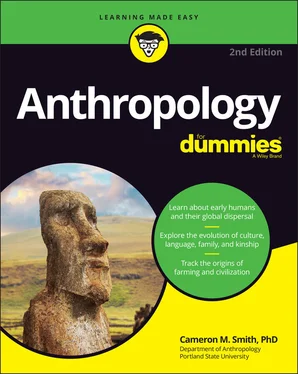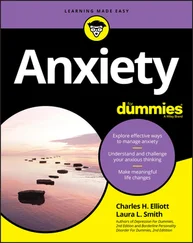Chapter 5tells you how archaeologists learn about the past, from carbon dating to meticulous excavation. Chapter 7tells you about the spread of modern humans out of Africa and across the globe, and Chapter 8gives some exciting examples of how humanity adapted to every environment imaginable, including the Arctic and the Pacific.
Humanity has more facets than just where we came from, our relations to the other primates, or how our ancient civilizations rose or fell. You also have to consider the whole original question of why people today differ worldwide. How come traditional Polynesian clothing is different from traditional clothing in the Sahara? Why do many Asian people eat with chopsticks, but others use a fork and knife? Why is it okay for a man to have several wives in one culture but not in another culture?
Unfortunately, the common sense answers are rarely right — chopsticks aren’t some archaic precursor to fork and knife, they’re just a different way of getting food into the mouth. Similarly, the ways in which people find marriage partners in traditional Indian society (perhaps by arranged marriages) and traditional German society are different because of the history of the culture in these regions, not because one is an “advancement” on the other. Cultural anthropologists study why these variations exist in the first place, and how they’re maintained as parts of cultural traditions, as elements of a given society’s collective identity, its culture.
Part 3of this book covers this field of cultural anthropology, the study of living human cultures and the great diversity in how people behave. Overall, these chapters give you the nuts and bolts of what cultural anthropologists have learned about living human cultures. Chapter 11tells you just what culture for anthropologists really means (no, it’s not the opera or stuffy wine-and-cheese parties) and how critical it is for human survival.
In Chapter 12you see that all human cultures are basically ethnocentric , meaning that they typically believe that their own way of doing things — from how they eat to how they dress — is proper, right, and superior to any other way of doing things. This feeling of superiority can lead (and has led) to everything from poor intercultural relations to ethnic cleansing. Cultural anthropologists, and the knowledge and understanding they generate while studying the many different ways of being human, can help smooth out intercultural communications; how they do this is also covered in Chapter 12. It can help humans understand other perspectives.
Part 3also explains why race and ethnicity can be such volatile issues ( Chapter 14), how humanity organizes identity (from family groupings to gender categories) and keeps track of who’s related to whom ( Chapter 15), and the basic characteristics of humanity’s various religious traditions and political systems ( Chapter 16).
Depending on whom you ask, humanity as a whole speaks something like 6,000 human languages (though most people on Earth speak only one of about five languages). Chapter 13explains what language is and how linguistic anthropologists investigate how language evolved in the first place — one of the most fascinating questions in all of anthropology. In laying out a clear definition of language, linguistic anthropologists have had to compare human communication with the communication systems of other living things. All of what they’ve learned — from the fascinating study of how humans acquire language to the layers of meaning that seem to only be present in human communication — give humanity a better understanding of just how unique and precious language is.
That uniqueness is in jeopardy, though, because languages become extinct every year as more people take up just speaking just one of the handful of main languages spoken worldwide today.
Making Sense of Anthropology’s Methods
Anthropology’s methods range from lab analysis of DNA to taking notes on Sicilian (or any culture’s) body language. Each of these methods helps better understand the many ways of being human. The following list gives you an overview of some of these methods:
Evolution is the foundation of modern biology, and physical anthropologists — who study humanity from a biological perspective — rely on it. Check out Chapter 3for the lowdown on exactly what evolution is and isn’t and how it helps anthropologists study humanity.
Archaeology isn’t just Indiana Jones dodging bad guys and saving priceless treasures. Chapter 5covers the methods of archaeologists, from keeping track of where objects are found to dating them by the carbon-14 method.
Do cultural anthropologists really get grants to go to other countries and observe human behavior? Yes, but there’s a lot more to it than that! Chapter 12covers the methods of cultural anthropology, from observation to immersion in a subject culture.
The complexity of human language is one of the main characteristics distinguishing us from non-human animals. Chapter 13shows you how anthropologists think about and study language.
Applied Anthropology: Using the Science in Everyday Life
Part 4of this book introduces the many ways that the lessons of anthropology are relevant in daily life. Anthropology isn’t just studied by scruffy professors clothed in tweeds (although I have to admit that yes, I do have a tweed jacket). Anthropologists are employed by many companies and government agencies, bringing what they know of humanity to the tables of commerce, international diplomacy, and other fields, as applied anthropologists .
Applied anthropologists help humanity get along in a very literal sense. Chapter 17shows how the lessons of anthropology are important to understanding and preventing cultural conflict.
Anthropology also helps humanity survive. Humanity faces enormous challenges, from overpopulation to language extinction and climate change (covered in Chapter 18) and “common-sense solutions” to these problems aren’t too effective, sometimes because what we think of as “common sense” may not apply in a culture other than our own. But with a subtler understanding of why humanity is the way it is, applied anthropologists are better suited to implementing changes, particularly on the community level, than many government officials who may know a lot about high-level politics but little about cultural traditions and values in the smaller communities they govern.
Chapter 19takes you into the lab, where anthropologists are analyzing DNA with methods that can help you find out where your genetic roots lie. This chapter shows you that they ultimately lie in the great continent of Africa.
Finally, Chapter 20has some exciting examples of how archaeological discoveries help us flesh out the history books. The common people of the ancient world — and unless you’re royalty, that means your ancestors — didn’t write much, but archaeology has given them a voice. Here you can find out about the lives of common laborers of ancient Egypt, American slaves, and the vanished Greenlandic Norse.
Chapter 2
Looking Into Humanity’s Mirror: Anthropology’s History
IN THIS CHAPTER
 Figuring out exactly what anthropology studies
Figuring out exactly what anthropology studies
 Discovering how anthropology defines humanity and culture
Discovering how anthropology defines humanity and culture
 Reviewing the historical roots that led to modern anthropology
Reviewing the historical roots that led to modern anthropology
Читать дальше

 Figuring out exactly what anthropology studies
Figuring out exactly what anthropology studies










